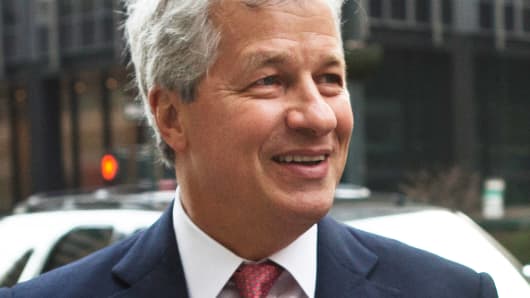In what followed, he managed to almost bury the issue in a tidal wave of banker talk. (Note, to really get a feel for how Cavanagh sounds, you have to pronounce the word "our" as "are" or listen to the webcast.)
"I'd repeat, I'd guess," he began, despite not having said anything about the issue yet, "having been in the jobs I've been in for the better part of the last decade basically and having engaged with our, you know, our board and our management team and how it operates I just affirm from where I sit, you know, where we stand on the idea that the decision of how any particular company at any particular time decides to set up its governance, inclusive of whether, you know, the CEO and chairman should be a split role or singular role is something that should be for the board to decide. That's fundamentally what our position, you know, on that, what our board's position on that is, and it makes complete sense when you look at how our board and our teams operate. It obviously got three years running of record results. The businesses across the board are in great shape, as everybody's heard from all of our business leaders on investor day. Fought our way through the financial crisis and obviously, you know, mistakes happened on our watching, including the London Whale. But I would point more to the response of the board, the management team, as evidence that things work actually quite well. So, uh, that's that."
You can almost feel the humidity building beneath the shirt collar in that long, rambling answer. Any particular company. Any particular time. Anything, that is, to avoid talking directly about Dimon or the possibility that the roles of JPMorgan's chief and chair would get split. That's that. Wishful thinking, no doubt.
Then something funny happened. That was that. In the very open question-and-answer session that followed for the next 40 minutes, investors and analysts just did not seem that interested in the split. It was all over CNBC, all over the Wall Street Journal,and all over Bloomberg terminals. But it didn't loom large on the radar of investors and analysts.
This phenomenon was repeated time and time again in meetings with various shareholders and analysts in the weeks leading up to Tuesday's shareholder meeting. Executives would prepare extensively to deal with questions about the shareholder proposals but when face to face with real, actual ordinary shareholders, the preparation was often for naught, according to people familiar with the matter.
The bank watched the proxy tally very closely. A war room was created to keep careful count of the proxy votes. The early vote counts were far more in favor of the proposal to split the chair and chief executive than the meetings with investors would suggest, according to a person close to the matter.
Board members were dispatched to convince large investors to vote against the proposal. Some were strategically paired with investors over whom the board thought they might have the most influence. Executives held calls with big institutional clients.
It's still not clear what turned the tide. Was it the outreach by executives and board members? Or was it the hints—some would say threats—that Dimon would leave the company if denied the chairmanship? Dimon has long had a reputation for being uncomfortable in the presence of other people's authority. This could have persuaded some investors to change their minds.
Other investors were prompted to vote by all the attention the issue received. People at two different investment firms told me they were prompted to vote their shares of JPMorgan after following the coverage in the media. Ordinarily they wouldn't have bothered.
"When it looked like this might be close, we thought we'd better vote for Jamie," one said.
They asked not to be named because, well, hedge funds hate to show up in stories like this.
"I'm not sure it was anything we did, per se. I think that all the attention this issue garnered in the press helped us out," one person at JPMorgan said.
"It would be great to know what did it. I don't think anyone knows for sure what worked," another person at JPMorgan said.
Whatever it was, it worked. The vote for splitting the top roles at the bank fell to 32.2 percent from 40 percent last year.
And that, as Mike Cavanagh said, was that.



